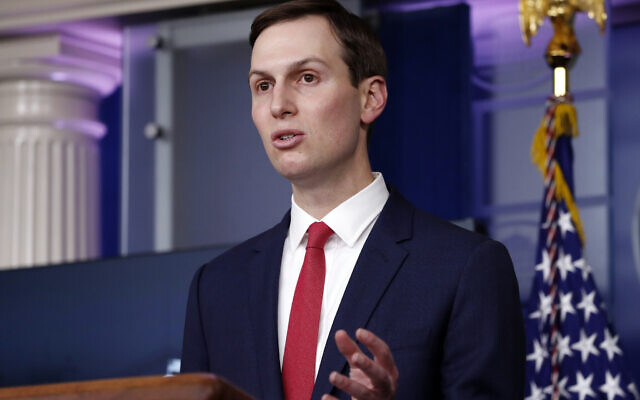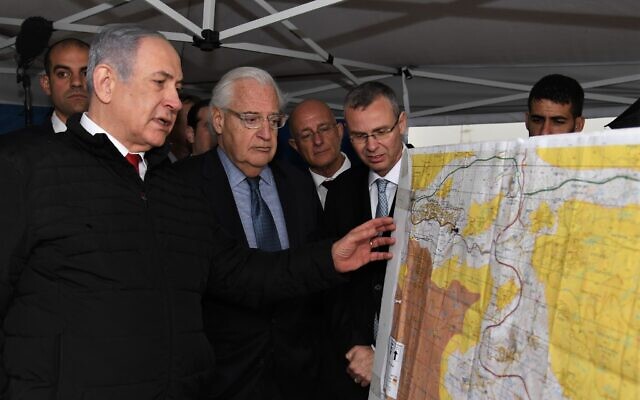No Final Decision on Israeli Annexation After 3 Days of White House Talks
US Ambassador Friedman, Mideast envoy Berkowitz set to return to Israel for more work, less than a week before Netanyahu’s July 1 target date to start process.

The White House has not made a final decision in a round of talks about whether to back Israel’s plan to annex parts of the West Bank, a senior White House official said.
“There is yet no final decision on next steps for implementing the Trump plan,” the official said, adding only that the talks had been “productive.”
The Times of Israel reported early this month that the White House was “highly unlikely” to green light Israeli annexation by July 1, that more work was needed on the mapping of the territories, and that Berkowitz and Jared Kushner would likely first come to Jerusalem to discuss outstanding issues.
This week’s White House discussions reportedly also included senior adviser Kushner and national security adviser Robert O’Brien. It was not clear whether US President Donald Trump was actively involved in the meetings.

Netanyahu has said he wants to annex the 132 West Bank settlements and the Jordan Valley — the 30 percent of the territory allocated to Israel under the Trump administration’s Israeli-Palestinian peace plan.
The new government’s coalition deal allows Netanyahu to begin the process as early as July 1. However, US enthusiasm for such a move has appeared to cool amid vociferous opposition from American allies in the Middle East.
Concerned about the collateral damage that could follow from allowing Israel to move ahead with its plan, Washington is reportedly considering backing the annexation of only a handful of settlements close to Jerusalem.
The administration is also looking at other options, including a staged process in which Israel would start by declaring sovereignty only over several settlements in the Jerusalem area, the report said, citing an unnamed source.
The official noted that Washington has not ruled out Netanyahu’s larger annexation vision but is concerned that a large-scale, rapid, unilateral move by Israel could seal off any chance that the Palestinians may agree to discuss Trump’s peace plan, unveiled in January.

The administration is also worried about increasing opposition to annexation coming from Jordan and US-allied Gulf States that have been building ties with Israel, the source explained.
Jordanian King Abdullah last week deemed unilateral annexation “unacceptable” in briefings to American lawmakers, and is expected to withdraw his ambassador, downgrade ties with Israel and reconsider the 1994 Israel-Jordan peace treaty if Netanyahu goes ahead with such a move.
Channel 13 reported Thursday that Mossad Chief Yossi Cohen had visited Jordan within the last few days at Netanyahu’s request, where he met with the king and delivered an unspecified message from Netanyahu regarding annexation.
Another central issue in the White House deliberations is believed to be the internal disagreement in the Israeli coalition over annexation: While Netanyahu is vigorously championing the move, Defense Minister Benny Gantz and Foreign Minister Gabi Ashkenazi have repeatedly said the Trump plan should be implemented in coordination with Jordan and the Palestinians and should not damage Israel’s relations with its neighbors.
According to a report by the Kan public broadcaster Thursday, Gantz and Ashkenazi’s Blue and White party will hold a closed meeting Friday on the issue, with all party MKs required to attend.

Last week, Channel 13 news reported that Netanyahu presented Gantz and Ashkenazi with four scenarios for annexing West Bank lands, one of which was said to be a symbolic move rather than the full 30%. The report did not provide further details on the different scenarios. A subsequent Channel 12 report said, by contrast, that all four of Netanyahu’s maps provided for annexing all 132 settlements, and that the overall territory to be annexed in these four scenarios ranged from 12% to the full 30%.
As of last weekend, the Israel Defense Forces had not yet seen maps of the territories proposed for annexation, but reports Friday said Israeli security officials would be shown the maps this week.
A joint US-Israel committee has been mapping out the West Bank areas set to come under Israeli rule, and has not yet completed its work, having been delayed in part by the COVID-19 pandemic.
On Thursday the UN’s Middle East envoy Nickolay Mladenov warned that annexation may fuel extremism, ignite a regional conflict and do irrevocable damage to Israeli-Palestinian relations.
Meanwhile, terror group Hamas issued a new threat that Israel would pay an “unprecedented price” if it annexes West Bank land, saying such a development would be a “declaration of war.” In an Arabic-language video message, Hamas spokesperson Abu Obeida said: “We will force the enemy to regret that decision.”
Also on Thursday, nearly 200 Democratic House members penned an open letter to the Israeli leadership, warning against the move.




comments